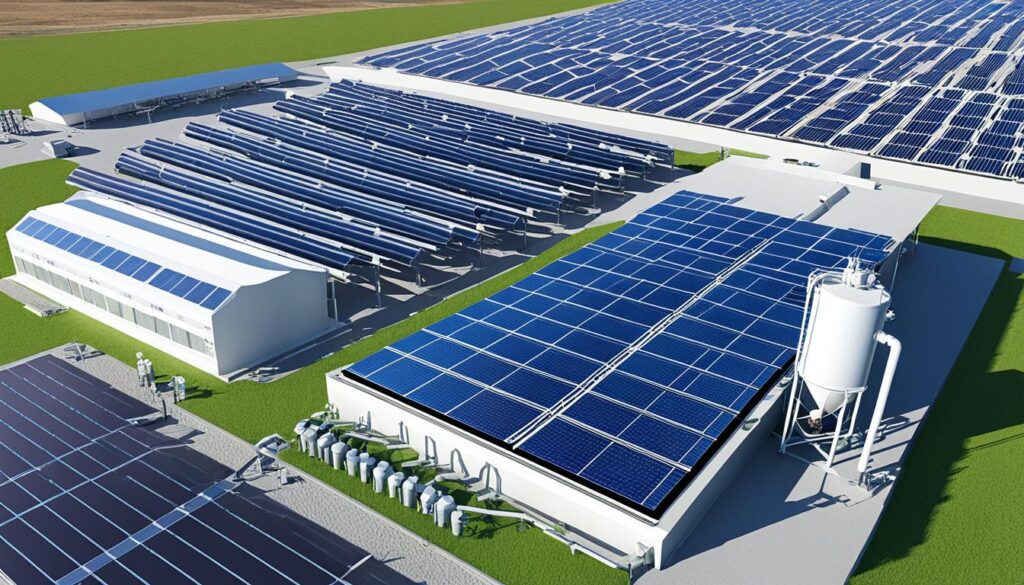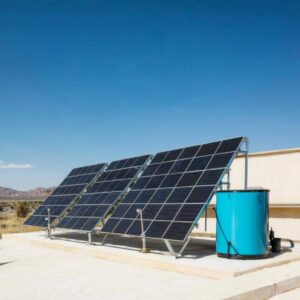
Solar energy is a sustainable power source that has the potential to revolutionize our energy landscape. It is defined as the energy derived from the sun’s radiation, harnessed through the use of solar panels and other technologies. Unlike fossil fuels, solar energy is clean and does not contribute to greenhouse gas emissions, making it a key player in the shift towards a sustainable future.
The Bureau of Land Management (BLM) is actively working towards developing utility-scale renewable energy to meet the goal of a net-zero energy grid by 2035. As part of this effort, the BLM is considering various alternatives for solar energy development on public lands, including those in Nevada. Nevada, with its vast amount of available land controlled by the BLM, plays a crucial role in the plan to expand solar energy generation.
Key Takeaways:
- Solar energy is a sustainable power source that harnesses the sun’s radiation.
- The Bureau of Land Management is actively working towards a net-zero energy grid.
- Nevada is a key location for solar energy development on public lands.
- Solar energy has the potential to revolutionize our energy landscape and provide a clean, sustainable future.
Challenges in the Solar Energy Sector Impacting Eguana Technologies Inc.
Eguana Technologies Inc., a leading developer and manufacturer of high-performance energy storage systems, is currently navigating through the challenges posed by the underperformance of the solar energy sector. This sector’s slower-than-expected recovery, influenced by decreased consumer spending, inflation, high-interest rates, and increased dealer fees, has had a direct impact on Eguana’s operations.
One of the notable challenges that Eguana faces is liquidity management. Delays in payments from key customers have affected the company’s cash flow and financial stability. In response to these issues, Eguana has implemented measures to improve liquidity, including negotiating debt amendments and completing a private placement.
Despite the steps taken, the company continues to experience delays and shortfalls in receiving payments from key customers, further exacerbating its liquidity concerns. To address this situation, Eguana is actively exploring various options to enhance liquidity and maximize shareholder value. This includes considering short-term funding opportunities, strategic investments, and potentially further rationalizing its business and strategy.
“Adapting to the current market conditions is of utmost importance,” says Justin Holland, the CEO of Eguana Technologies Inc. “We remain committed to executing our operational objectives, particularly in the virtual power plant space, while prioritizing liquidity management.”
Eguana Technologies Inc.’s Strategies to Overcome Liquidity Challenges
Eguana Technologies Inc. is strategically addressing its liquidity challenges to regain financial stability. The company is:
- Exploring additional short-term funding options to ensure timely cash flow and meet financial obligations.
- Considering strategic investments that align with its long-term growth objectives while diversifying revenue streams.
- Continuing to evaluate and potentially undertake further rationalization of its business and strategy to streamline operations and optimize costs.
Eguana Technologies Inc. acknowledges the importance of adapting to the evolving solar energy sector and believes that effectively managing liquidity is crucial for the company’s continued success. The focus remains on delivering reliable and innovative energy storage solutions, particularly within the virtual power plant space.

Conclusion
Solar energy is a defining force in shaping our future. Its potential to provide a clean, sustainable power source is undeniable. Despite the challenges faced by companies like Eguana Technologies Inc. in the solar energy sector, there is a need for continuous adaptation and strategic planning to overcome obstacles.
The underperformance of the sector has resulted in liquidity management issues and delays in payments from key customers. However, it is crucial to remain focused on advancing relationships in the virtual power plant space. By connecting homeowners and utilities, we can create a seamless experience through the distributed grid transition.
As we work towards a net-zero energy grid, it is imperative to address the challenges faced by the industry and explore alternative solutions. By doing so, we can ensure the continued growth and success of solar energy as a clean and sustainable power source. Together, we can pave the way for a brighter, greener future.
FAQ
What is solar energy?
Solar energy is the energy derived from the sun’s radiation, and it is a sustainable power source that has the potential to revolutionize our energy landscape.
What is the role of the Bureau of Land Management (BLM) in solar energy development?
The BLM is actively working towards developing utility-scale renewable energy, including solar energy, to meet the goal of a net-zero energy grid by 2035. Nevada, with its vast amount of available land controlled by the BLM, plays a crucial role in this plan.
How many alternatives has the BLM presented for solar energy development?
The BLM has presented five alternatives to protect a varying amount of land for solar energy development. These alternatives range from opening up 55 million acres of public land for development to the most restricted choice of only 8.4 million acres. Each alternative has its own set of restrictions and considerations, with the BLM expressing a preference for Alternative 3.
What is the deadline for public input and written comments on the BLM’s alternatives for solar energy development?
The public has the opportunity to provide input and submit written comments until April 18, 2024.
What challenges is Eguana Technologies Inc. facing in the solar energy sector?
Eguana Technologies Inc. is facing challenges due to the underperformance of the solar energy sector. Decreased consumer spending, inflation, high-interest rates, and increased dealer fees have resulted in a delayed market recovery, impacting liquidity management.
What measures has Eguana Technologies Inc. taken to improve liquidity?
Eguana Technologies Inc. has taken measures to improve liquidity, including negotiating debt amendments and completing a private placement.
What options is Eguana Technologies Inc. exploring to enhance liquidity and shareholder value?
Eguana Technologies Inc. is exploring various options to enhance liquidity and enhance shareholder value. These options include short-term funding, strategic investments, and potentially further rationalization of the business and strategy.
What is the CEO of Eguana Technologies Inc., Justin Holland, emphasizing in response to the challenges?
The CEO, Justin Holland, emphasizes the importance of adapting to current conditions and continuing to execute operational objectives, particularly in the virtual power plant space.
What is the primary focus of Eguana Technologies Inc. despite the challenges in the solar energy sector?
Despite the challenges, the primary focus of Eguana Technologies Inc. remains on advancing relationships in the virtual power plant space and delivering on the mission to connect homeowners and utilities for a seamless experience through the distributed grid transition.
What is the importance of addressing obstacles and exploring alternative solutions in the solar energy industry?
As the industry works towards a net-zero energy grid, it is crucial to address obstacles and explore alternative solutions to ensure the continued growth and success of solar energy as a clean and sustainable power source.








